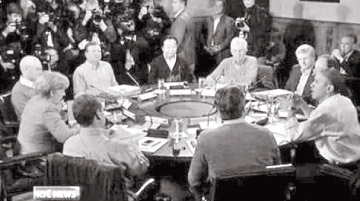G8 leaders agree on tax evasion measures
Leaders of the G8 major economies have agreed on new measures to
clamp down on money launderers, illegal tax evaders and corporate tax
evaders. Governments agreed to give each other automatic access to
information on their residents' tax affairs.
They will also require shell companies - often used to exploit tax
loopholes and invest money anonymously - to identify their effective
owners.
The summit communique urged countries to "fight the scourge of tax
evasion". The measures are designed to combat illegal evasion of taxes
and legal tax avoidance by large corporations that make use of loopholes
and tax havens.
|

G8 leaders at a discussion |
The summit in Northern Ireland also saw the launch of free trade
negotiations between the EU and US, which UK Prime Minister David
Cameron, who was hosting the summit, dubbed "the biggest bilateral trade
agreement in history".
Tax, trade and transparency, dubbed 'The Three Ts', were placed at
the top of the UK's agenda for its presidency of the G8, which consists
of the UK, US, Germany, France, Italy, Russia, Canada and Japan.
But the summit has been overshadowed by the conflict in Syria. The G8
leaders, including Russian President Vladimir Putin, an ally of Syrian
leader Bashar al-Assad, backed calls for Syrian peace talks to be held
in Geneva "as soon as possible".
Cameron said the leaders had managed "to overcome fundamental
differences", but no timetable for the Geneva talks was given, and the
statement made no mention of what role Assad could play in the future.
Leaders agreed that multinationals should tell all tax authorities
about what taxes they pay and where.
"Countries should change rules that let companies shift their profits
across borders to avoid taxes," the communique said.
It follows revelations about the ways in which several major firms,
including Google, Apple, Starbucks and Amazon, have minimised their tax
bills. Illegal activities, including tax evasion and money laundering,
will be tackled by the automated sharing of tax information. Ahead of
the summit, the Organisation for Economic Co-operation and Development
(OECD), proposed to share tax information by building on an existing
system set up by the US and five major European economies, but on a
global scale.
"This international tax tool is going to be a real feature of
ensuring that we get proper tax payment and proper tax justice in our
world," said Cameron, who claimed that it meant "those who want to evade
taxes have nowhere to hide".
The OECD includes all of the G8 members except Russia.
Among the information to be shared will be who actually ultimately
benefits from the shadowy shell companies, special purpose companies and
trust arrangements often employed by tax evaders and money launderers.
Earlier in the day, Chancellor George Osborne unveiled plans for a UK
register of companies and their owners. The White House also announced a
similar plan for the US.
Last week the UK also revealed a deal with its crown dependencies and
overseas territories, including the Channel Islands, Gibraltar and
Anguilla, to start sharing more information on which foreign companies
bank their profits there.
About a fifth of offshore tax havens, which are used by
multinationals to shelter cash from the tax authorities, are British
dependencies.
"Of course Britain's got to put its own house in order," said
Osborne, adding that the government would launch a consultation on
whether the register should be published or just be available to the
HMRC.
Osborne said more progress had been made on reforming the global tax
system in the past 24 hours than the "past 24 years". The G8 communique
also demanded more transparency from mining firms.
It follows revelations that many major mining companies use complex
ownership structures in the Netherlands and Switzerland to avoid paying
taxes on the minerals they extract in developing countries.
"Developing countries should have the information and capacity to
collect the taxes owed them," the communique said. The governments
agreed that mining companies should disclose all the payments they make,
and that "minerals should not be plundered from conflict zones".
"We agreed that oil, gas and mining companies should report what they
pay to governments, and that governments should publish what they
receive, so that natural resources are a blessing and not a curse," said
Cameron.
The G8 leaders also agreed to stamp out ransom payments to kidnappers
for the release of hostages. Cameron said tens of millions of dollars in
ransom money had been paid around the world in the last three years.
UK government officials have often expressed their frustration at
alleged ransom payments being made to secure the release of French,
Italian and other European hostages seized in the Sahara and elsewhere,
said the BBC's Security correspondent Frank Gardner.
But since those governments have never publicly owned up to paying
ransoms this G8 agreement may be easier to sign than to enforce, he
added.
BBC
|


